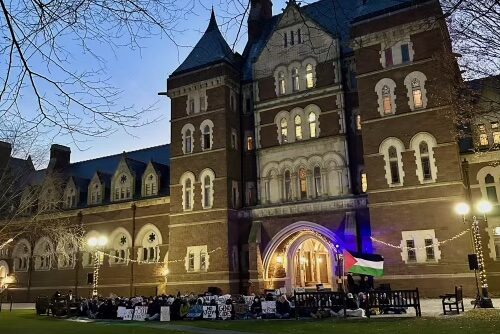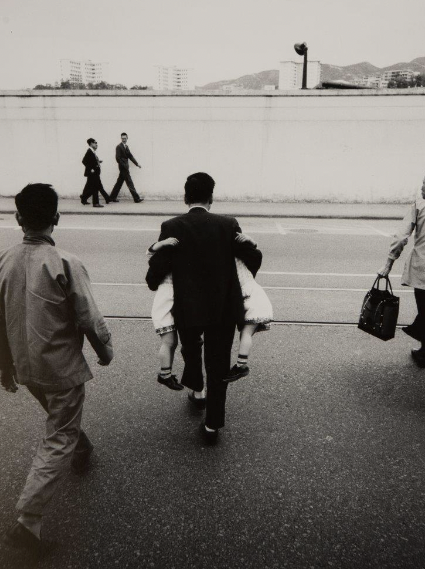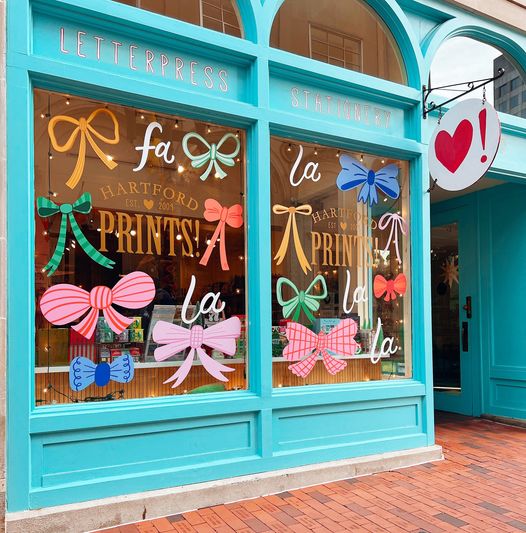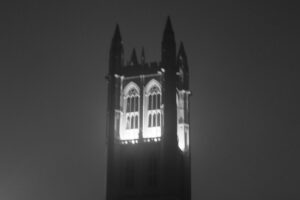Lily Mellitz ’26
Staff writer
Wearing masks and keffiyehs, an organized group of peaceful student protesters proceeded in silence to the main quad on Thursday, Nov. 30 during the College’s annual ‘Light the Long Walk’ Event, holding posters and Palestinian flags as they gathered at the Fuller Arch. The students turned their backs to the designated podium for the president’s address, facing the audience on the quad silently with their arms linked.
This was Trinity’s third annual ‘Light the Long Walk’ — a new campus tradition bringing together Trinity’s community for a festive celebration on the Main Quad. However, against the backdrop of the ongoing Palestine/Israel crisis and the recent Vermont shooting of three Palestinian students including Tahseen Ali Ahmad ‘26, the festivities carried a somber undertone.
In detailing the demonstration, student protester Akira Marie ’26 provided insights into the motivations behind the protest.
“Our intended message for Trinity was to share that we don’t believe this institution is doing its best,” said Marie. “We wanted to shine a light on specific aspects of Trinity that have been lacking and also shine a light on how those aspects have severely affected many students.”
‘Light the Long Walk’ is a festive event that celebrates many winter holidays and festivals including but not limited to Christmas, Hanukkah, Bodhi Day, St. Lucia Day, Winter Solstice, Shabe Yalda, Dongzhi Festival, Pancha Ganapati, Soyal, Kwanzaa, Watch Night, New Year’s Day and The Epiphany. Held on the Main Quad under a large tent, it typically features live holiday music performed by Trinity’s a cappella groups, hot chocolate and winter desserts and a range of participatory festive activities organized by student clubs and organizations. This year, Trinity students, staff and faculty came together to ring in the holiday season with a tree lighting ceremony, a hot chocolate bar and the solemn gathering of approximately 80 students engaging in silent protest.
Nest Artists President Charlie Taing ‘25 revealed in a recent interview that this protest “Ha[d] been in the works for quite a while.”
Highlighting the intricate dynamics within his student club, Nest Artists, Taing provided insights into the internal deliberations and ethical dilemmas that unfolded in the lead-up to both the planned protest and the club’s participation in ‘Light the Long Walk.’
“Nest Artists is a part of MAC [Multicultural Affairs Council of Student Government Association],” said Taing. “During a MAC meeting on Nov. 19, two cultural house representatives urged all of us MAC organizations to collectively boycott ‘Light the Long Walk’ because it’s an event hosted by JBS. At this time Nest Artists had already been asked to participate and had been committed to the event since early November.”
Taing continued, “As the president and treasurer I was left with the difficult decision to either boycott or participate, so I turned to my club for their input. Every member expressed uncertainty of the protest’s objective. What did the protesters want JBS to do, exactly? We were evenly split on next steps, so ultimately I decided to proceed with the plans since we had already dedicated so much work and time into preparations. The decision was challenging for me since it morally went against my beliefs, as I do believe Trinity and JBS should address what’s going on. At the same time, I’m not even sure if my actions would’ve made a difference.”
Reverend Marcus G. Halley, the College Chaplain and Dean of Spiritual and Religious life, was first to address the gathering. Following suit, Rabbi Rachel Putterman, Director of Hillel and Associate Chaplain, spoke next. The sequence concluded with President Joanne Berger-Sweeney delivering the final address. In her remarks, President Berger-Sweeney disclosed her recent communication with Tahseen’s mother and Tahseen himself, conveying that plans were in progress for his mother and sister to travel abroad to support Tahseen during his recovery.
In a display of unity, Halley, Putterman and Berger-Sweeney articulated their collective sorrow for the lives lost on all fronts. The speakers navigated the subject matter with a balanced approach. They maintained a composed and measured tone throughout, expressing grief for the suffering endured by all parties involved.
“They played it very safe to the point where they didn’t say anything at all,” Taing commented. “I got the feeling that they were notified of the protest beforehand and had edited their speeches to address that a protest was happening without condoning it or taking a stance.”
As President Berger-Sweeney concluded her speech, the protesters seated themselves on the ground. Notably, several onlookers were moved to join the demonstrators in solidarity. The remaining attendees, a group of around 30, gathered beneath a large tent on the quad to savor hot cocoa and engage in festive crafts. The juxtaposition of the solemn, silent protesters amid the backdrop of a festive celebration created a notable contrast.
“The protestors’ silence was haunting, especially as sugar-laced Christmas music continued to play as if nothing was happening,” said Charlotte DeSimone ‘26. “We are in the international spotlight, and yet the college is serving cocoa and marshmallows like nothing happened.”
Comparing this year’s event to the previous year, the impact of the protest on attendance and overall engagement was evident. Last year saw active participation from numerous student clubs, along with a substantial turnout of students, staff and faculty, making seating a challenge due to the increased attendance. In stark contrast, this year saw only one additional club participating besides Nest Artists, leading to a significantly reduced turnout.
Reflecting on the sparse attendance, Taing remarked, “Maybe ten people in total came to our station during the entire hour and a half event.” The aftermath was evident in the numerous empty chairs and tables with leftover food remaining at the end of the event, underscoring the noticeable shift in attention towards the protest.
The subsequent morning (Friday, Dec. 1) saw the release of the “Trinity Campus Weekly” newsletter, featuring ‘Light the Long Walk’ description with accompanying photos. Noticeably absent from the newsletter were any captions or statements of the peaceful protest, despite the significant presence of the crowd of demonstrators. Photos of the protest were included in the photo gallery.
Reacting to the notable absence of acknowledgement regarding the event, Marie conveyed her sentiments.
“It’s very disappointing, but I would not say that I’m particularly angry or surprised,” Marie remarked. “This is to be expected. Especially as a person of color, you almost expect institutions like these to let you down. This is one of the first opportunities I’ve had in my life to actually stand up and do something about it and to have the power to do something about it, and I think that is what I will be trying to do for the rest of my time here.”







Marie is disappointed the College’s P.R. vehicle “Trinity Campus Weekly” didn’t highlight the protest. However, she is not surprised. Okay, I can follow that. But then she shares a bizarro world view that the reason Trinity Campus Weekly didn’t highlight a protest during the College’s festive event is an institutional oppression of people of color. No, Marie. Trinity Campus Weekly “contains news about the life of the college and the accomplishments of our campus community”. It is prepared by the College’s Office of Communications and MARKETING. The reason Trinity Campus Weekly didn’t highlight the protest is because publicizing protests during festive College events is not the purpose of Trinity Campus Weekly.
So the lack of highlighting the protest, as per your argument, is because student dissent (which Trinity encourages) is not markeatable?
It amazes me how quickly the two students interviewed managed to make it all about themselves, pulling attention away from the cause they were supposed to be demonstrating about.
Maybe Trinity should, instead of requiring Wellness and Experiential credits to graduate, require students to volunteer at hospital, clinics, or soup kitchens. Perhaps this could help them to understand the true meaning of human rights advocacy, social justice, and selfless empathy.
Also: “Especially as a person of color, you almost expect institutions like these to let you down”…
Only that the President of the College is BIPOC; so is the Vice President of DEI (Anita Davis); so is the College Chaplain and Dean of Spiritual and Religious Life (Marcus George Halley); so is the Dean of the Faculty and VP of Academic Affairs (Sonia Cardenas); so is the Dean of Student Life (Jody Goodman); so is the Director of Community Standards and Restorative Justice (Selders); so is the General Counsel and Secretary of the College (Mathieu); so is the Chief of Staff and Associate VP for External Affairs (Rojas), etc., etc.
If anyone feels that this institution is letting them down because they are a person of color, then maybe they should take it with all of those administrators listed above. All of them highly recognized and accomplished academic professionals who have reached the highest administrative echelons at Trinity College.
Surely things at Trinity are far from perfect. I think we all can agree. But when was the last time you heard any of those administrators complaining of how “unjustly” they have been treated by the College?
Wait a minute… let me get this straight: so the organizers “had already dedicated so much work and time into preparations” yet simultaneously “Every member expressed uncertainty of the protest’s objective.” This poetically summarizes not only Trinity’s caliber of student, but more so the aesthetic facade that overlies the anti-Israel sentiment so vehemently defended by college-aged intelligentsia. If you don’t truly grasp what you espouse yet spew the most loaded language including genocide-speak, consider a serious refrain from your actions.
Still trying to figure out what the protest was intended to accomplish. Apparently, so are the protesters.
[…] of the year to advocate for divestment from and condemnation of Israel, with the first happening at last fall’s Light the Long Walk event and the second being held shortly after fall break in response to a Palestinian Trinity student […]